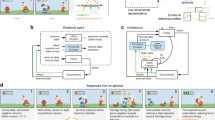Abstract
This paper addresses the issue of personality of an animat in terms of anticipation, motivation and emotion. It also discusses some relevant models and theories of personality, and their relation to the consequence driven systems theory. The main result of this work is a fundamental mathematical equation between the emotion, motivation, and behavior. In essence the result can be stated that what motivates an animat behavior is the value of the anticipated emotional consequence of that behavior. Experimental research with an artificial personality architecture is provided, supporting the obtained result.
Preview
Unable to display preview. Download preview PDF.
Similar content being viewed by others
References
Barto, A., Sutton, R., Anderson, C.: Neuronlike Elements that can Solve Difficult Learning Control Problems. IEEE Transactions on Systems, Man, and Cybernetics 13, 834–846 (1983)
Barto, A., Sutton, R., Watkins, C.: Learning with Sequential Decision Making. In: Gabriel, M., Moore, J. (eds.) Learning and Computational Neuroscience: Fundamentals of Adaptive Networks, pp. 539–602. MIT Press, Cambridge (1990)
Barto, A.: Reinforcement learning. In: Omidvar, O., Elliot, D. (eds.) Neural Systems for Control. Academic Press, London (1997)
Bellman, R.: Dynamic Programming. Princeton University Press, Princeton (1957)
Bozinovski, S.: Inverted pendulum learning control. In: ANW Memo. COINS. University of Massachusetts, Amherst (1981)
Bozinovski, S.: A Self-learning System Using Secondary Reinforcement. In: Trappl, R. (ed.) Cybernetics and Systems Research, pp. 397–402. North-Holland, Amsterdam (1982)
Bozinovski, S.: Consequence Driven Systems. Gocmar Press (1995)
Bozinovski, S.: Crossbar Adaptive Array: The First Connectionist Network that Solved the Delayed Reinforcement Learning Problem. In: Dobnikar, A., Steele, N., Pearson, D., Alberts, R. (eds.) Artificial Neural Networks and Genetic Algorithms, pp. 320–325. Springer, Heidelberg (1999)
Gadanho, S.: Reinforcement Learning in Autonomous Robots: An Empirical Investigation of the Role of Emotions. PhD Thesis. University of Edinburgh (1999)
Gadanho, S., Hallam, J.: Robot Learning Driven by Emotion. Adaptive Behavior 9(1), 42–62 (2001)
Gadanho, S.: Emotional and Cognitive Adaptation in Real Environments. In: Proc Symp ACE 2002 of the 16th European Meeting on Cybernetics and Systems Research, Vienna, Austria (2002)
Lewin, K.: Dynamic Theory of Personality. McGraw Hill, New York (1935)
Lewin, K.: Principles of Topological Psychology. McGraw Hill, New York (1936)
Lewin, K.: Field Theory in Social Science. Harper and Row, New York (1951)
Liebert, R., Spiegler, M.: Personality. The Dorsey Press (1974)
Loehlin, J.: Computer Models of Personality. Random House (1968)
Sutton, R.: Temporal credit assignment in reinforcement learning. Ph.D. Thesis. Computer and Information Sciences (COINS) Department, University of Massachusetts at Amherst (1984)
Watkins, C.: Learning from Delayed Rewards. Ph.D. Thesis. King’s College, Cambridge (1989)
Author information
Authors and Affiliations
Editor information
Editors and Affiliations
Rights and permissions
Copyright information
© 2003 Springer-Verlag Berlin Heidelberg
About this chapter
Cite this chapter
Bozinovski, S. (2003). Anticipation Driven Artificial Personality: Building on Lewin and Loehlin. In: Butz, M.V., Sigaud, O., Gérard, P. (eds) Anticipatory Behavior in Adaptive Learning Systems. Lecture Notes in Computer Science(), vol 2684. Springer, Berlin, Heidelberg. https://doi.org/10.1007/978-3-540-45002-3_8
Download citation
DOI: https://doi.org/10.1007/978-3-540-45002-3_8
Publisher Name: Springer, Berlin, Heidelberg
Print ISBN: 978-3-540-40429-3
Online ISBN: 978-3-540-45002-3
eBook Packages: Springer Book Archive




